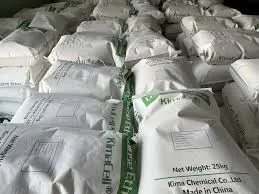
Sep . 07, 2024 04:38 Back to list
HPMC
Is HPMC Water Soluble?
Hydroxypropyl Methylcellulose (HPMC) is a widely used substance in various industries, particularly in pharmaceuticals, food, and construction. One of the key properties of HPMC that professionals often inquire about is whether it is water-soluble. Understanding this characteristic is crucial for optimizing its applications.
HPMC is a semi-synthetic polymer derived from cellulose, a natural polymer found in plant cell walls. The structure of HPMC consists of hydroxyl and methoxy groups that are chemically modified from the original cellulose. This modification contributes to its unique properties, including its solubility in water.
Is HPMC Water Soluble?
In the pharmaceutical industry, HPMC is commonly used as a binder in tablet formulations and as a thickening agent in liquid medications. Its water-soluble nature allows it to easily mix with other ingredients, ensuring a uniform distribution throughout the product. Additionally, HPMC can be utilized in controlled-release formulations due to its gel-forming properties when in contact with water, allowing for the slow, gradual release of active ingredients.
is hpmc water soluble

In the food industry, HPMC serves as a food emulsifier, stabilizer, and thickener. It is used to improve the texture and mouthfeel of various food products, including sauces, dressings, and baked goods. The water solubility of HPMC gives it a significant advantage in food applications, as it can easily incorporate into aqueous formulations without affecting taste or stability.
Moreover, in the construction industry, HPMC is utilized in cement and gypsum-based products. It enhances the bonding properties and workability of these materials. The water-soluble nature of HPMC allows for improved dispersion and interaction with water, leading to better performance of the final product.
Despite its numerous advantages, it is vital to consider the specific requirements of each application when using HPMC. Factors such as concentration, grade, and environmental conditions can all influence its performance. For instance, while HPMC is soluble in cold water, it may have varying solubility levels in hot water or different solvents.
In conclusion, HPMC is a water-soluble polymer with extensive applications across various industries. Its ability to dissolve in water allows for significant versatility as a binder, thickener, stabilizer, and emulsifier. Understanding the properties of HPMC and its solubility is essential for professionals utilizing this polymer in product formulation, ultimately leading to improved product quality and performance. As industries continue to evolve, the applications of HPMC will likely expand, making it a crucial component in innovative formulations.
-
Versatile Hpmc Uses in Different Industries
NewsJun.19,2025
-
Redispersible Powder's Role in Enhancing Durability of Construction Products
NewsJun.19,2025
-
Hydroxyethyl Cellulose Applications Driving Green Industrial Processes
NewsJun.19,2025
-
Exploring Different Redispersible Polymer Powder
NewsJun.19,2025
-
Choosing the Right Mortar Bonding Agent
NewsJun.19,2025
-
Applications and Significance of China Hpmc in Modern Industries
NewsJun.19,2025







